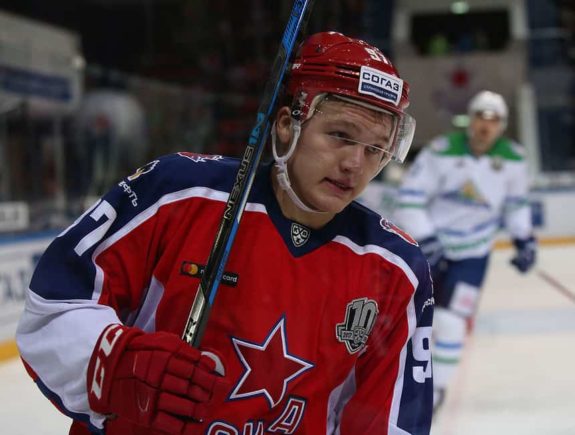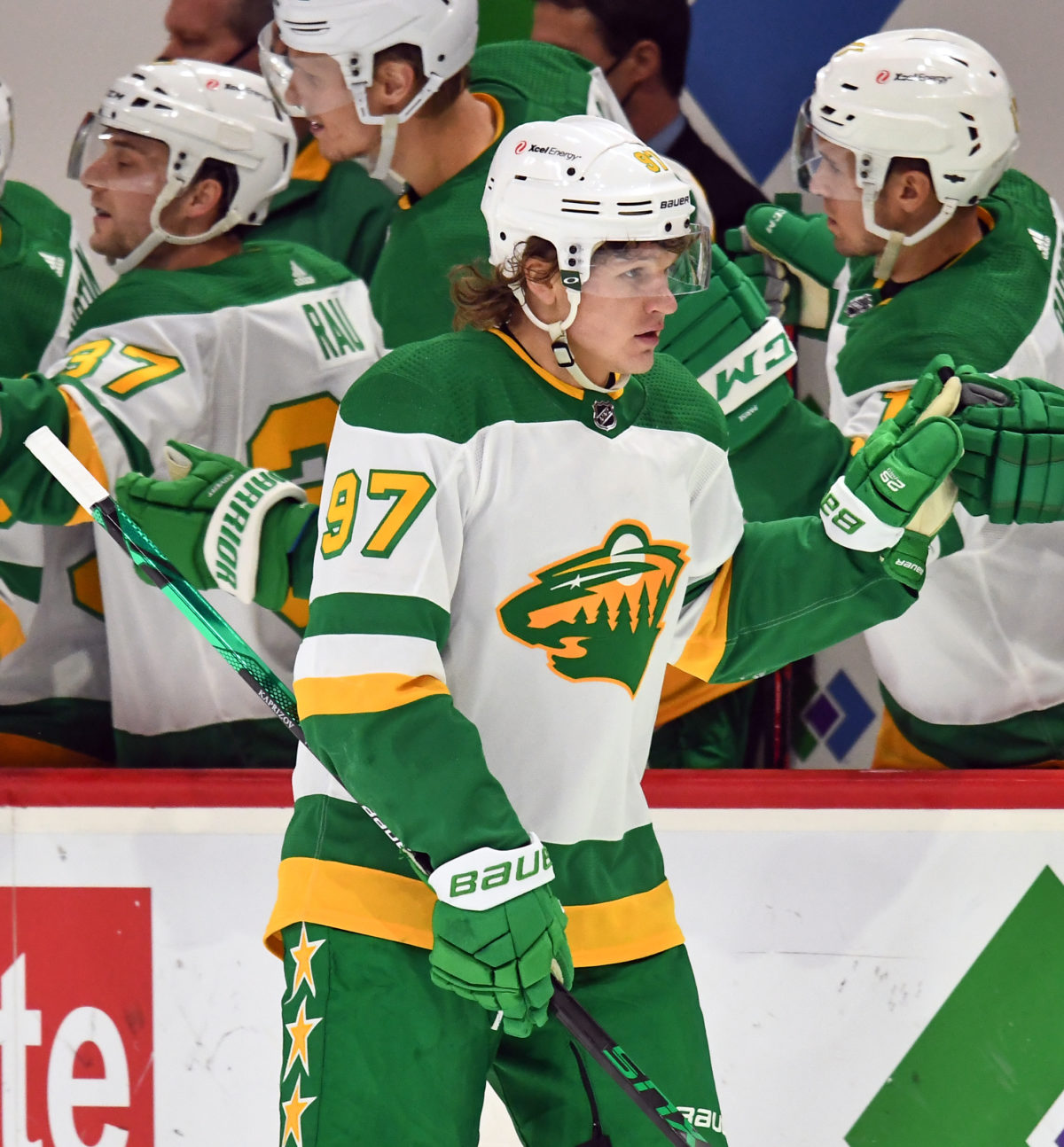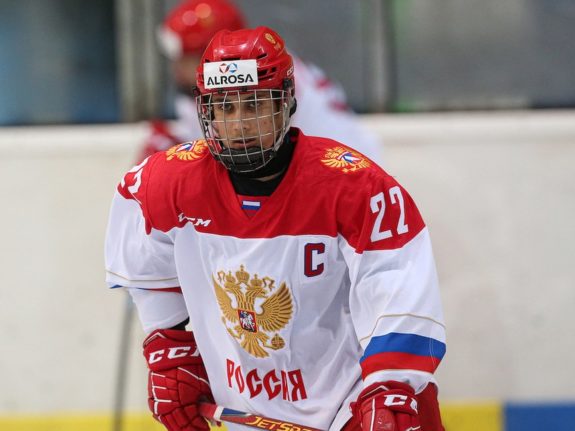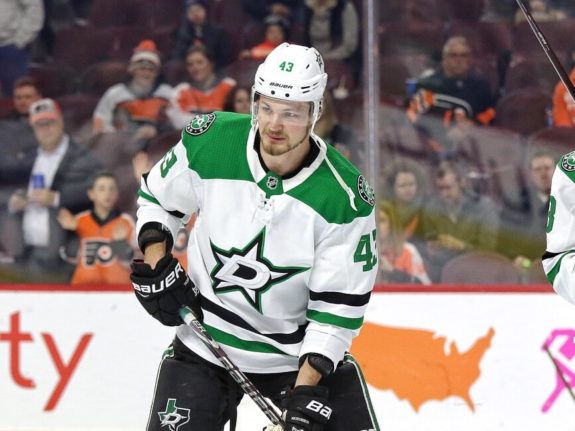For all the success, excitement, and pure dominance of Minnesota Wild rookie Kirill Kaprizov this season, what preceded were painstakingly long negotiations with no guarantee that the KHL star would sign or even come to North America. After nearly six years since being selected 135th overall in the 2015 NHL Entry Draft, Wild general manager Bill Guerin finally signed the Russian winger as part of the wider blueprint to bring Minnesota back to playoff contention. Where former GMs Chuck Fletcher and Paul Fenton could not accomplish, Guerin was the one to finally bring in the long-waited star, whose transition from the KHL to the NHL was seamless and helped propel the Wild to one of its most successful turnarounds.
The arduous process to ensure KHL-bound Russian prospects commit to their NHL clubs was one the Wild avoided for more than 11 years before Kaprizov’s selection. As a reminder, the team’s last Russian draft pick was goalie Anton Khudobin, a seventh-round pick in 2004 (206th overall).

Since taking the risk and finding a late-round gem in Kaprizov, the Wild have been more willing than ever to draft Russian players. In the last five NHL drafts, the Wild selected six Russian players, and with higher selections each year.
Since 2015, the Wild have drafted the following players from Russia or with rights retained by a KHL/MHL team:
- Dmitry Sokolov – 196th overall in 2016
- Andrei Svetlakov – 178th overall in 2017
- Alexander Khovanov – 86th overall in 2018
- Vladislav Firstov – 42nd overall in 2019
- Matvey Guskov – 149th overall in 2019
- Marat Khusnutdinov- 37th overall in 2020

This is a stark change compared to previous years, especially when you factor in only five Russians drafted by the team from the Wild’s inception in 2000 to 2015. Negotiations were tough with the Kaprizov, but the experience prepared Minnesota for future potential difficulties. Keeping the Russian star long-term is still in the air, especially with recent reports of a return to the KHL as potential leverage, but the silver lining is that the Wild have added protection following his entry-level deal: Kaprizov cannot be offer sheeted or go to arbitration.
Nonetheless, with the ongoing extension negotiations bound to be tough, the Wild are prepared to be patient with both Kaprizov and the growing group of Russian prospects. It is undeniable that the wait was worth it, even if it means bringing in these Russian players to the big club more polished and further along in their development.
The Russian Factor
There are several considerations NHL teams deal with when drafting players from Russia, who tend to have their rights retained by the KHL and MHL. Even when players are selected, they can opt to return to Russia if negotiations sour or become discontent with their role on the team.
NHL reporter Jamie Kelly described these considerations as the Russian Factor. Since the KHL’s inception in 2008, it led to an initial drop in Russian selections in the NHL Entry Draft. Coupled with the added negotiations and possible buyouts with KHL parent clubs, NHL teams face the possibility of a player bolting for the KHL if they (and their agents) deem their role and situations as less than ideal.

For reference, despite being the first overall pick in the 2014 KHL Junior Draft, Kaprizov’s commitment to Metallurg Novokuznetsk, as well as his desire to play for Russia (or the Olympic Athletes from Russia) in the 2018 Winter Olympics, prevented any substantial negotiations with the Wild for years. These commitments, coupled with Kaprizov’s 5-foot-7 frame and uncertainty of ever reporting to the NHL, further led to his slide into the later rounds. The stardom potential was on display at every level, but immediate earnings and playing time were other pressing factors as well.
The Wild’s cautious approaches were not baseless, however.
Valeri Nischuskin’s decision to leave the Dallas Stars and Nikita Filatov’s lack of development in the NHL are high-profile cases of up-and-coming Russian stars who bolted for the KHL. Nischuskin has since returned to the NHL, but with the Colorado Avalanche in 2018, leaving the Stars with no compensation for a 10th overall selection in 2013. The 6-foot-4 winger was considered a top-five prospect, whose Russian factor was overlooked by scouts at the time, according to Sports Illustrated’s Ryan Kennedy in the lead-up to the 2013 entry draft.

However, Kelly mentions that the initial drop-off of Russians selected subsided because teams like the Wild began to risk again and develop a willingness to wait and endure the tough negotiations. There are the recent examples of Vitali Kravtsov, Vasily Podkolzin, Yaroslav Askarov and Rodion Amirov – top-15 NHL draft picks right out of the KHL and MHL. Amirov signed with the Toronto Maple Leafs only months after he was selected in 2020, while Kratsov and Podkolzin further developed in the KHL for a couple of seasons before committing to the New York Rangers and Vancouver Canucks, respectively.
Latest Wild Content:
- Wild Report Cards 2023-24: Vinni Lettieri
- Wild Report Cards 2023-24: Brandon Duhaime
- Minnesota Wild Report Cards 2023-24: Connor Dewar
- 4 NHL General Managers on the Hot Seat This Season
- NHL’s 5 Most Overrated General Managers
Minnesota has yet to select a player out of the KHL in the first round, but the possibility is growing with the recent picks as evidence. While most of the team’s picks continue to come from everywhere except Russia, Kaprizov re-energizing enthusiasm and success in Minnesota has shifted the perception. Even when a star is not guaranteed, the team has more possibilities at the draft than ever.
Final Thoughts
Further evidence of the Wild’s willingness to draft out of Russia is doubling down on skilled, undersized centers with Khusnutdinov even after Marco Rossi fell to the ninth pick. In most 2020 mock drafts, including The Hockey Writers edition, Khusnutdinov was viewed as a late first-round pick, whose Russian factor was ignored for Minnesota and allowed them to get early in the second round.
The Wild went with best available out of Russia – an avenue previously unexplored by the old guard of scouts and management. Kaprizov’s dominance and importance to the Wild moving forward may not be replicated by the recent Russian picks. That was obvious, it is inspiring for future picks. What’s important is that Minnesota is no longer handcuffed by inexperience in tough negotiations and an unwillingness to navigate longer than expected waiting times for Russian players to come to North America.
If the recent picks are any indication, then it is no longer far-fetched to assume the Wild finally use a first-round pick on a player out of Russia in the near future.